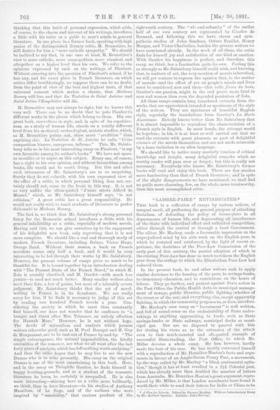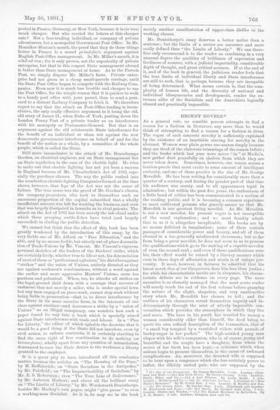" LAISSER-FAIRE " REVINDICATED.*
THIS book is a collection of essays by various writers, of unequal merit, all professing the general purpose of attacking Socialism, of defending the policy of laisser-faire in all departments of human life, and deprecating all interference of the State with individual effort and unlimited competition, either through the central or through a local Government. The editor, Mr. Mackay, made a favourable impression on the unprejudiced mind by his able work on the English poor, in. which he restated and reinforced, by the light of recent ex- perience, the doctrines of the Poor-Law Commission of the early part of this century, the partial adoption of which in the existing Poor-Law has done so much to redeem the English poor from the serfage to which the Elizabethan Poor-Law had reduced them.
In the present book, he and other writers seek to apply similar doctrines to the housing of the poor, to savings-banks, to elementary education, and to restrictions on the hours of labour. They go further, and protest against State action in the Post Office, the Public Health Acts, in municipal manage- ment of sewage, public libraries, public lighting (whether of the street or of the sea), and everything else, except apparently fighting, in which the community proposes to, or does, interfere.
Mr. Mackay's own essay on " Investment " is well written, and full of sound sense on the undesirability of State under- takings in anything approaching to trade, such as State savings-banks or State railways, municipal docks or muni- cipal gas. Nor are we disposed to quarrel with him for stating his views as to the extension of the attack even to that much-vaunted and oft-quoted example of successful State-trading, the Post Office, to which Mr. Millar devotes a whole essay. He has, however, hardly made the best of his case. He has mostly contented himself with a reproduction of Mr. Henniker-Heaton's facts and argu- ments in favour of an Anglo-Saxon Penny Post, a movement, by-the-way, called by Mr. Mackay "a blind, sentimental agita- tion," though it has at least resulted in a 2id. Colonial post, which has already more than doubled the number of letters from Australia. Mr. Henniker-Heaton's great argument, repro- duced by Mr. Millar, is that London merchants have found it worth their while to send their letters for India or China to be
* A Ptea for Liberty. Edited hy Thomas Maokay. With an Introductory Essay by Mr. Herbert Spencer. London: Jam Murray. posted in France, Germany, or New York, because it is (or was) much cheaper. But who carried the letters at this cheaper rate P Not a free-trading individual, or company of private adventurers, but a monopolist Government Post Office. In Mr. Henniker-Heaton's mouth, the proof that they do these things better in France is a sound primd-facie argument against English Post-Office management. In Mr. Millar's mouth, it is nihil ad rem ; for it only proves, not the superiority of private enterprise, but that in this respect State management abroad is better than State management at home. As to the Parcels Post, we simply dispute Mr. Millar's facts. Private enter- prise had not given us a cheap small-parcels carriage, until the State Post Office began to compete with the Railway Com- panies. Even now it is much less trouble and cheaper to use the Post Office, for the simple reason that it is quicker to walk to a handy post office with your parcel, than to send a post- card to a distant Railway Company to fetch it. We therefore regret to say that the attack on Post-Office trading is incon- clusive, the only really effective argument in it being the old, old story of James II., when Duke of York, putting down the London Penny Post of a private trader as an interference with his monopoly as Postmaster-General. But that is an argument against the old aristocratic State interference for the benefit of an individual or class, not against the new democratic government interference on behalf of and for the benefit of the nation as a whole, by a committee of the whole people, which is called the State.
Still more inconclusive is the attack of Mr. Beauchamps Gordon, an electrical engineer, not on State management but on State regulation in the case of the electric light. He tries to make out that electric lighting has not yet been a success in England because of Mr. Chamberlain's Act of 1882, espe- cially the purchase clauses. The way the public rushed into the numberless electric-lighting Companies formed at the time shows, however, that fear of the Act was not the cause of failure. The true cause was the greed of Mr. Gordon's clients, the company-promoters, who took to themselves such an enormous proportion of the capital subscribed that a wholly insufficient amount was left for working the business, and even that was largely dissipated in lawsuits as to rival patents. The attack on the Act of 1882 has been merely the ink-cloud under which these grasping cuttle-fishes have tried (and largely succeeded) in eluding the public detection.
We cannot but think that the effect of this book has been greatly weakened by the introduction of this essay, by the very feeble one of Mr. Alford on "Free Education," and the able, and by no means feeble, but utterly out-of-place denuncia- tion of Trade-Unions by Mr. Vincent. Mr. Vincent's vigorous personal sketches of the leaders of the Dockers' strike, which are certainly lively, whether true to life or not, his denunciation of most of them as "professional agitators," his diatribes against " strikes " and the union of Unions, entirely directed as they are against workmen's combinations, without a word against the earlier and more aggressive Masters' Unions, seem too partisan and polemical. When, too, he attacks all strikes on the legal ground (laid down with a courage that savours of rashness) that not merely a sailor, who is under special laws, but any man engaged on piece-work, cannot stop work without being liable to prosecution—that is, to direct interference by the State in its most coercive form, in the interests of one class against another—and denounces a strike by a "union of Unions" as an illegal conspiracy, one wonders how such a paper found its way into a book which is specially aimed against State interference with trade and labour. In a "Plea for Liberty," the editor of which upholds the doctrine that it would be a good thing if the State did not interfere, even by civil action, to enforce contracts, it is certainly startling to find the mere right of free combination to do nothing (or laisser-faire), wholly apart from any question of intimidation, denounced because the State denies to the workman a liberty granted to the employer.
It is a great pity to have introduced all this combative matter, because the articles on "The Housing of the Poor," by M. Raffalovich; on "State Socialism in the Antipodes," by Mr. Fairfield ; on "The Impracticability of Socialism," by Mr. E. S. Robertson ; even "The True Line of Deliverance," by Mr. Auberon Herbert; and above all the brilliant essay on "The Limits of Liberty," by Mr. Wordsworth Donisthorpe, besides Mr. Maclay's own paper, might "give pause" to even a working-man Socialist. As it is, he may see in the book merely another manifestation of upper-class dislike to the working classes.
Mr. Donisthorpe's essay deserves a better notice than a sentence ; but the limits of a review are narrower and more easily defined than "the Limits of Liberty." We can there- fore only recommend it to the reader as combining in a very unusual degree the qualities of brilliance of expression and liveliness of manner, with a judicial impartiality, considerable depth of thought, and great critical acumen. If at the end of it, and of the book in general, the judicious reader feels that the true limits of individual liberty and State interference are still to seek, that is, perhaps, because they are incapable of being determined. What seems certain is, that the com- plexity of human life, and the diversity of national and individual idiosyncrasies and development, render the ex- tremes alike of the Socialists and the Anarchists logically absurd and practically impossible.







































 Previous page
Previous page